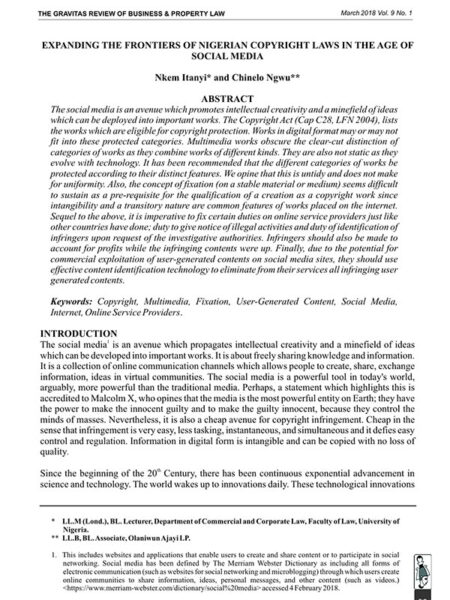-
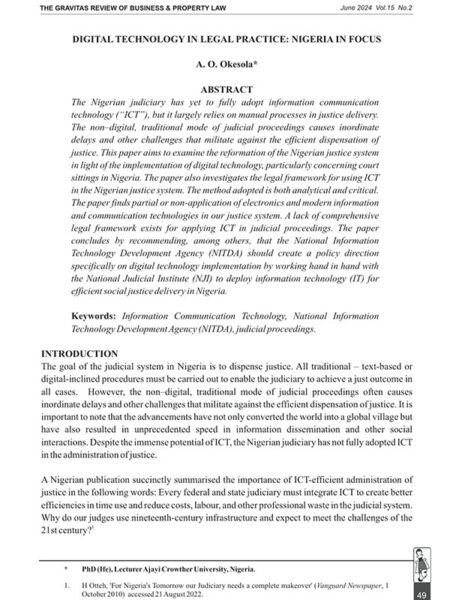
Digital Technology in Legal Practice: Nigeria in Focus
0₦2,500.00Dr. A.O. Okesola, in his article, Digital Technology in Legal Practice: Nigeria in Focus, examines the reformation of the Nigeria justice system in the light of the implementation of digital technology, particularly as it pertains to court sittings in Nigeria. Okesola also investigates the legal framework for the use of ICT in the Nigeria justice system. The method adopted is both analytical and critical. Okesola finds that there is partial or non – application of electronics and modern information and communication technologies in our justice system. There is also non – existing comprehensive legal framework for the application of ICT in judicial proceedings. Okesola concludes by recommending among others that the National Information Technology Development Agency (NITDA) should create a policy direction specifically on digital technology implementation by working hand in hand with the National Judicial Institute (NJI) to deploy information technology (IT) for efficient social justice delivery in Nigeria.
-
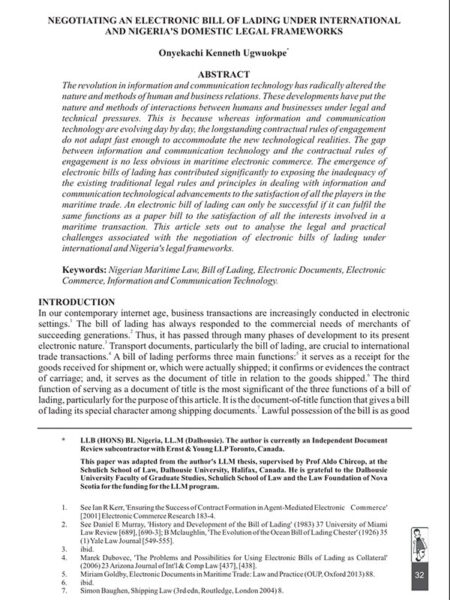
Negotiating an Electronic Bill of Lading under International and Nigeria’s Legal Frameworks
0₦2,500.00Onyekachi Ugwuokpe, Independent Document Review Subcontractor with Ernst & Young LLP Toronto Canada in his article, Negotiating an Electronic Bill of Lading under International and Nigeria’s Domestic Legal Frameworks, notes that although electronic bill of lading in shipping business has great advantages, including savings in time and monetary costs, it has been difficult to replicate the document-of-title function of a bill of lading in an electronic setting. The difficulty for an electronic bill to achieve negotiability arises from the fact that much of the relevant existing legal rules on, and commercial procedures for, negotiating bills of lading are entirely paper-based. The electronic bill of lading is also caught up with the common challenges of electronic documentation, which results from the inability of traditional contract principles to catch up with the rebellious advancements in information and communication technology. Onyekachi masterfully analyses the legal and practical challenges associated with negotiating electronic bills of lading under international and Nigeria’s legal frameworks.
-
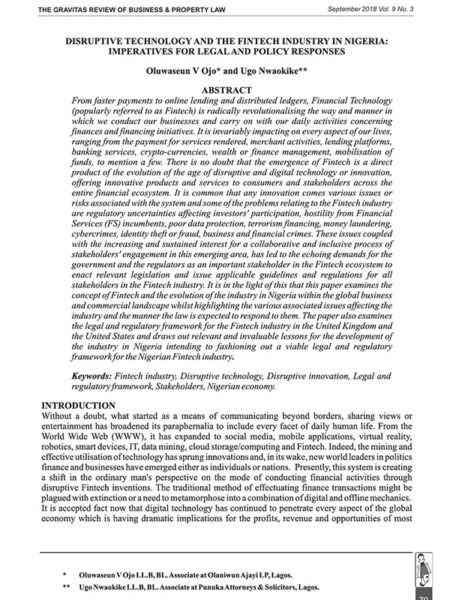
Disruptive Technology and the Fintech Industry in Nigeria: Imperatives for Legal and Policy Responses
0₦2,500.00Oluwaseun Ojo of Olaniwun Ajayi LP, and Ugo Nwaokike of Punuka Attorneys and Solicitors in their article, Disruptive Technology and Fintech Industry in Nigeria: Imperatives for Legal and Policy Responses, note that the emergence of Financial Technology (popularly referred to as Fintech) is a direct product of the age of disruptive and digital innovation. Fintech is impacting on every aspect of lives, ranging from payment for services, merchant activities, lending platforms, banking services, crypto-currencies, wealth and finance management. They appraise issues affecting the Fintech industry in Nigeria including regulatory uncertainties affecting investors’ participation, hostility from Financial Services (FS) incumbents, poor data protection, terrorism financing, money laundering, cyber crimes, identity theft and financial crimes. They review the legal and regulatory framework for the Fintech industry in the United Kingdom and the United States and draw out relevant lessons for the development of the sector in Nigeria.
-
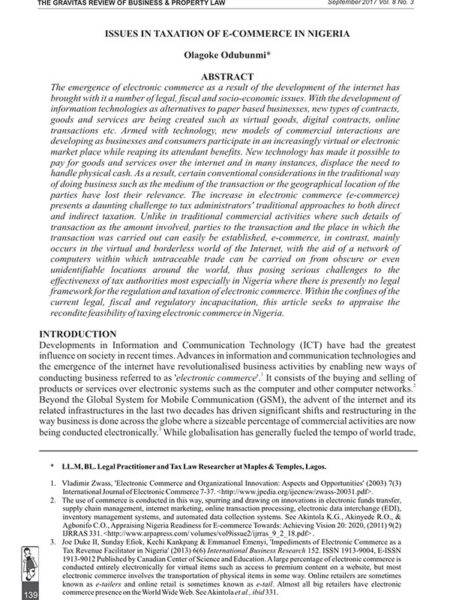
Issues in Taxation of E-Commerce in Nigeria
0₦2,500.00Olagoke Odubunmi, Legal Practitioner and Tax Law Researcher at Maples & Temples, in “Issues in Taxation of E-Commerce in Nigeria”, argues that the main difficulty that electronic commerce poses for the Nigerian tax system stems from the fact that extant national laws governing income taxation are premised on the assumptions of physical presence of parties to business transactions. With the need for physical presence removed or diminished in e-commerce, there is a problem of how to determine the right to tax profits that are derived, with same having intrinsic implications for the full realisation of income tax revenues. Within the confines of the current legal, fiscal and regulatory incapacitation, Odubunmi appraises the challenge of taxing e-commerce in Nigeria.
-
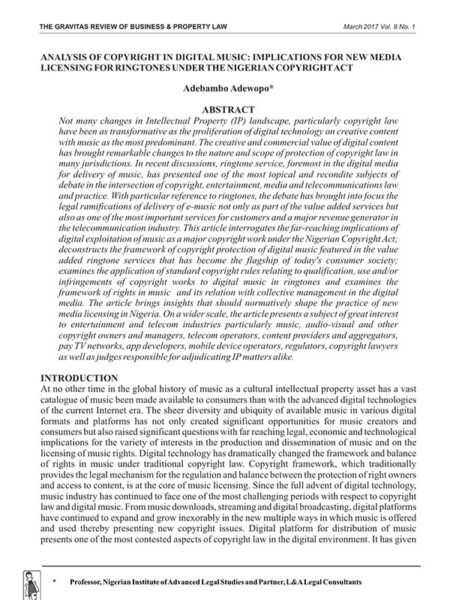
Analysis of Copyright in Digital Music: Implications for New Media Licensing for Ringtones under the Nigerian Copyright Act
0₦2,500.00Professor Adebambo Adewopo of the Nigerian Institute of Advanced Legal Studies and Partner, L & A Legal Consultants, in his article “Analysis of Copyright in Digital Music: Implications for New Media Licensing for Ringtones Under the Nigerian Copyright Act” provides a seminal exposition of the intersection of copyright law and entertainment, media and telecommunication industries in Nigeria, addressing the most contested and recondite issue in those industries at the moment. The article interrogates the far-reaching implication of digital exploitation of ring tunes under the Nigerian Copyright Act; deconstructs the framework of copyright protection of digital music; considers the copyright rules for qualification, use and infringement of work, and application to digital music in ringtones; examines issues relating to the key rights and collective management in the digital media under the extant Copyright Act and discusses insights that should shape the practice of new media licensing that is ultimately of great interest to practitioners in the creative economy.
-
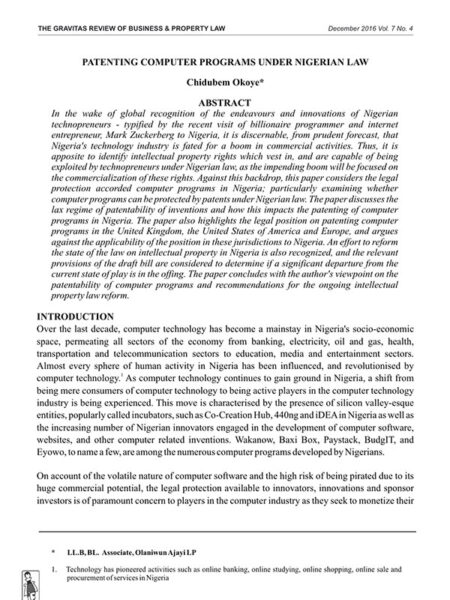
Patenting Computer Programs under Nigerian Law
0₦2,500.00In the wake of the increasing number of Nigerian innovators engaged in the development of computer software, websites and programs like Wakanow, Baxi Box, Paystack, BudgIT, and Eyowo, Chidubem Okoye, Associate at Olaniwun Ajayi LP in his article “Patenting Computer Programs Under Nigerian Law” considers the patentability of computer programs in Nigeria and the state of the law in US and Europe.
-
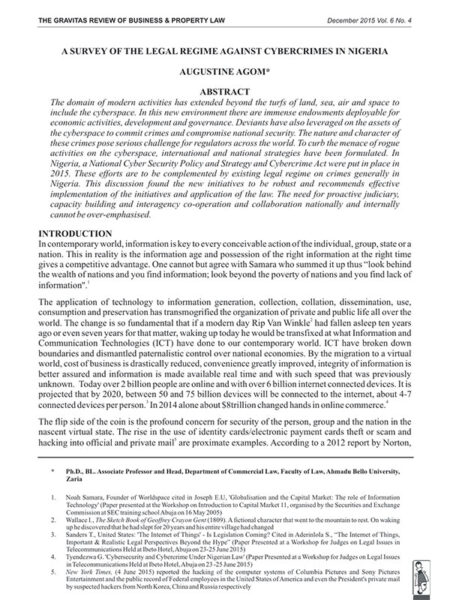
A Survey of the Legal Regime against Cybercrimes in Nigeria
0₦2,500.00Augustine Agom, Associate Professor of Law and Head, Department of Commercial Law, Ahmadu Bello University, Zaria in “A Survey of the Legal Regime against Cybercrimes in Nigeria” analyses the nature and character of cybercrimes and the provision of various laws having bearing on cybercrimes including the Cybercrimes (Prohibition, Prevention Etc.) Act 2015.
The Gravitas Review of Business & Property Law

